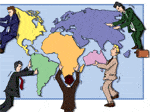Gordon PlattAs more countries mature and enter the global market, the balance of economic and political power is changing. Businesses will have to stay on their toes to prosper.

After undergoing a decade of dramatic change, the worlds economy looks very different than it did throughout the 1990s. A host of countries that were just finding their economic feet and beginning to play on the global stage now have economic and political power to spare. The titans of the West have also seen their roles change as they have discovered they can no longer expand with impunity into the farthest flung corners of the earth.
This is the inevitable result of globalization, which, by one definition, is a process of greater integration within the world economy through movements of goods and services, capital, technology and (to a lesser extent) labor, which lead increasingly to economic decisions being influenced by global conditions. That definition is as apposite as everperhaps even more so, given the acceleration of economic integration both globally and regionally. But, as many formerly emerging markets mature and more countries enter the global market, the balance of economic and political power is changing. The businesses and economies that prosper will be playing by a whole new set of rules.
One of the symptoms of this change is that yield-hungry investors are looking farther afield as their traditional stomping grounds are beginning to look less like emerging markets. The extremely favorable conditions in global capital markets (see box, page 22) for emerging markets over the past few years encouraged more stable types of investors, such as pension funds from the United States, to invest in emerging markets assets. Thats really benefited the large developing economies such as Brazil, Mexico, Turkey and some of the Asian countries, says Lauren Phillips, a research fellow at Londons Overseas Development Institute. As a result, though, the yield on those markets has fallen. Investors have been looking at smaller emerging markets, which can now access international capital much more easily, she adds.
The changes taking place are not driven only by investors dipping their toes in new markets; the very workings of the globalization machine are turning differently now. No longer does globalization just describe the process of western multinationals moving into new markets. Now it is more about convergence, with companies around the world having the same access to sophisticated technology and banking services.

|
|
new Asia is more innovative and networked |
In many ways, the changes are being led by the global banks. As they work to grow their business and develop new markets and products, the banks are facilitating rapid growth in cross-border tradeof goods, services and currencies. Technology is the great facilitator. Companies no longer have to establish a physical presence in multiple countries because, in many cases, they are simply linking up with local businesses and either outsourcing or offshoring their production and administrative functions.
As such services become more commoditized and universal, poorer countries can enjoy the greatest transformative impact. The benefits for a newly emerging economy of being able to tap into these sophisticated and highly efficient processes from day one can barely be overstated. Instead of waiting on the platform for the slow train of economic progress to rattle into the station, these economies are able to jump straight onto an express that is already halfway to their destination.
In a perhaps unexpected spin-off, the sharp rise in the availability of information, primarily through the Internet, has enabled the worlds central bankers to raise their game to a whole new level. Aided by a wealth of information about how best to run a modern economy and by the reams of detail available about what their peers are doing and how they are faring, the worlds central bankers are exhibiting a dramatic rise in competence and effectiveness. According to the central bankers organization, the Bank for International Settlements (BIS), central bankers have been able to hone their craft as their access to information and the general level of transparency around central banks operations has increased.
Imbalanced Output
While there is no continent where the effects of globalization are not evident, some regions and nations are faring far less well than some of their erstwhile peers. The contrasts between Latin America and East Asia provide a perfect example. Nowhere has the transformation wrought by globalization been more dramatic than in East Asia, much of which suffered economic meltdown during the financial crisis of 1998. The fallout from that crisis showed the region was riddled with many of the problems that seem to be endemic to developing economiescorruption, cronyism and nepotismand observers at the time were predicting that it would be many years before the regions formerly dynamic economies regained their luster. That those commentators proved to be so wrong is symptomatic of the dramatic changes that have taken place in the very nature of globalization. Far from descending into economic chaos, many of the countries in the region worked hard to root out the problems and to rebuild their economies on a much more sustainable basis.
According to Homi Kharas, chief economist for the East Asia Pacific region at the World Bank, the regions countries have been able to stage this rapid recovery because they abandoned the traditional model of simply providing large, low-income workforces to mature industries from the developed world, instead taking a new approach to building their economies. The new Asia is more innovative and networked. Its characterized by a very competitive business environment that encourages new products and processes and a labor force able to absorb new ideas, he says.
Growth and development in Asia have been so rapid that some are concerned that a number of other major emerging markets, particularly in Latin America, are getting left behind. Latin Americas economies have failed to diversify into technology-oriented products and high-end manufacturing, and they continue to be driven by commodities and raw materials, says Phillips. To some extent its growth is driven by that, though, because it is providing the source materials Asia needs to continue developing, she adds.
Within individual countries there are also clear losers from globalization. Joseph E. Stiglitz, a Nobel Prize-winning economist and former adviser to former US president Bill Clinton, says that while globalization has meant that countries have become more economically interdependent, which requires us to work together collectively, economic globalization had not kept pace with democratic institutions. We have a system where often the outcomes are not just, he explains. There are winners and losers. On paper GDP may be high in some of the developing countries, but that doesnt mean that country is better off.
Stiglitz also notes that there are losers in developed countries, too, particularly those whose jobs are shipped to foreign markets. In his latest book, Making Globalization Work, Stiglitz takes a remarkably similar position to the US Federal Reserve chairman Ben Bernanke, pointing out that a governments failure to ensure its workers are cushioned from the harsh realities of globalization will prompt those people to become increasingly opposed to trade and in favor of economic protectionism. You have to protect them, says Stiglitz, to help them find new jobs, increase education and provide job assistance. The first thing is to realize that there are losers as a result of trade liberalization, he comments.
In his speech to the Feds annual meeting this year, Bernanke urged policymakers to ensure that the benefits of globalization would be felt at all levels and not just by the rich. At the same meeting, Stanley Fischer, the head of Israels central bank and a former first deputy managing director of the IMF, countered that, while there will be economic casualties, they are merely symptomatic of the shift in economic power that is under way. He agrees that the giant gains from globalization appear to be concentrated in just a handful of countriesChina and India being the most prominentbut the countries that trade with them will also benefit.
Chinas voracious appetite for raw materials, which has produced a boom in commodity prices, has helped many developing countries, as well as commodity-rich industrial countries like Australia, Fischer said. China and Indias energy needs have helped push oil and other energy prices to their highest sustained levels and have contributed to the prosperity of energy producers in the Middle East, in Russia and central Asia, and also in Africa where there are now many oil exporters.
According to Phillips, the two countries are also bringing finance to places that have been passed over in previous waves of globalization: China and India are investing in Africa or in Latin America, taking risks in countries where western firms have tended not to invest, such as Sudan, she says. India has put a large amount of money into Bolivia, and China also has large investments in Latin America.
A Double-Edged Sword
The rapid growth of still-developing countries such as Russia, China and India means they wield enormous economic and political power, but it also presents something of a double-edged sword. China, for example, which despite its gargantuan size is still very much a developing market, is already practicing some of the economic adventurism that the European powers were so fond of in the 19th century. Conscious of its seemingly insatiable hunger for energy and raw materials, it is frantically building relationships with resource-rich nations, particularly in Latin America, Africa and central Asia. Unfortunately, it is also prone to practicing some heavy-handed political manipulation in its attempt to secure future resource supplies. Shortly before Zambias recent presidential election, China announced that its companies would stop investing in Zambia until it was clear that the China-friendly incumbent president would be re-elected.
Russia, too, has been flexing its muscles in the past year, clearly demonstrating that it, too, has growing political and economic power. Few would argue, however, that abruptly turning off the energy supplies to its neighbors was a responsible use of that power.
Brave New World?

|
|
losers as a result of trade liberalization |
There is no disputing the numbers: Trade is growing at a tremendous rate, while countries across the emerging world are seeing their absolute GDP and their GDP per head growing rapidly. Many millions of people have been lifted from poverty in the past decade. At the same time, according to Stiglitz, more than 40% of the worlds population still lives in poverty.
The numbers do not tell the whole story, though. Inequality remains, within countries and between them, and in many nations, both developed and developing, the gulf between the rich and the poor is growing ever wider. Some analysts suggest this is the result of changing corporate behavior: Companies are reaping huge financial benefits from globalization but are passing on their swelling profits not to their workers but to their shareholders and, in the US at least, their senior managers. Ben Bernanke has already brought this to light, while in China officials are trying to find ways to ensure the benefits from that countrys explosive growth are shared more evenly. If both those economic giants are successful in creating more equable economies, we could be witnessing the dawn of yet another new phase of globalization in which multinationals become more acutely aware of the debt they owe their employees.
Dan Keeler



